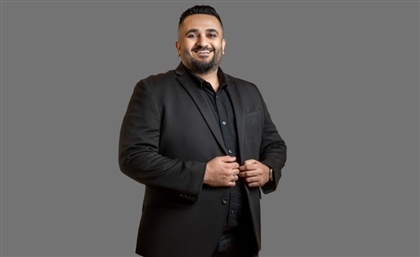This Fearless Startup Explains Why Team Building is the Most Crucial part of Creating a Company
Having amassed multinational clients like Danone, Coke, Etisalat, Vodacom Tanzania, Redbull, and Bank Audi, PHI Group is breaking into the information-based consultancy sector in a rather unorthodox way - by proving that the key to understanding data is actually understanding people.

If you asked any random person to define data, they'd be likely to tell you it's all about numbers... numbers, figures, facts, analysis. These are cold words. But to the seven best friends behind this Egyptian daring data startup, the heart of data isn't about numbers and figures at all. According to the PHI Group's extroverted founders, it's about relationships.
Their startup is an information consultancy group that specialises in data analytics and marketing research - taking numbers and turning them into knowledge, insights and advice. They're a people-oriented numbers company, and their focus on relationships - relationships between people, between numbers, between seemingly unrelated events - is what makes their insights powerful. The team makes for a colourful group; they're an energetic young band of fearless data-conquerors, brimming with lively conversation punctuated by regular bursts of laughter.
A people-centered focus is what built their startup in the first place - the friendship between the founders was the real drive behind its genesis. It's unusual for a successful business to begin based on a relationship rather than a concept, but these rebellious entrepreneurs have never been interested in doing things the typical way. "The foundation of everything about us is relationships: relationships between us and our clients, between our clients and theirs, between data and knowledge. They're all two-way relationships," says 28-year-old statistics whiz Sylvana Youssef.
The group's name, PHI, is a Greek letter and a number with unusual mathematical properties - it's strangely prevalent in nature, art, and architecture, often unintentionally. "It's a golden ratio," Youssef says, "a number that makes things perfect and puts them into perspective." Gamal expands on its significance to the team philosophy, adding that "what's important to me is that it's a ratio, which is a relationship between two data points, and that is what we are when it comes to business. We make sense out of data and report it to our clients in a way that helps them make decisions."
Founder Ahmed "Jimmy" Gamal stresses that they've all come from multinational corporations, and that their way isn't better; it's just different - but the PHI Group's methods have produced some very clear proof that there's more than one path to perfection. Less than two years after breaking into Egypt's growing information industry, the PHI Group has carved out a golden niche for itself: they're still playing by their own rules and they've already worked with major clients such as Danone, Coke, Etisalat, Vodacom Tanzania, Redbull, Dreem, Bank Audi, P&G, TE Data and a host of other household names. They've already been involved in 160 successful projects with over 70 clients in Egypt, and across the world, from Europe to Africa.

Co-founder Marwa Farid says the group is "reinventing the wheel" in a new way each and every time they take on a new client, but it could just as easily be said that they're doing much more than finding new ways to climb the same slope. The fearless group of friends is crafting a custom vehicle for every client, every challenge, based on the individual features of each new landscape. The seven function as a cohesive group, although their focus on individuality is a central component of their winning strategy.
Gamal explains that the desire to form a startup came organically to the group, many of whom had known each other for several years. "Many of us came from multinationals. The idea of PHI came from the fact that those of us who worked together were operating on a completely different rhythm from the rest of the company. We were trying actively to create value, rather than just contributing to the bottom line, and this sparked a desire to step out and and try our luck doing something different," says the 33-year-old entrepreneur. Former economist Seif Shouhaib, elaborates. "There was a mutual feeling between the seven of us, even before we started talking about a startup, that we all wanted to do something different and we wanted to do it together. There's a rebellious streak within all of us. We're all pushing and and pulling in different directions at times - we want different things, but we don't clash. We find common ground through being friends."
There's a rebellious streak within all of us. We're all pushing and and pulling in different directions at times - we want different things, but we don't clash.
"We've built a family," says Gamal, "and we're sticking together. Maybe today we're in research, tomorrow we're in consultancy. Maybe we'll own a manufacturing business; it doesn't matter. At the end of the day we stand together, shaking things up as we go. When we started PHI my wife had just given birth to my twins. I believe that this group is my third child. Somehow I have the same feelings to this entity and to each and every person here, this kind of love. I never even thought I could be a parent and now I'm a parent to two at home and these six here." The group laughs and nods in agreement. Farid adds, "We're believers in his decision making and his capability. We're all in agreement that he's the one taking the boat to another level." Analytics and insights master Ahmed Ibrahim continues, "Jimmy moving this company forward successfully makes us all feel confident. We're not stressed with our work. We have the freedom to focus on doing our best while Jimmy handles the logistics and the company image, and we have trust that we're going the right way."
Gleaning knowledge and insights from the numbers is part of PHI's challenge, and this is where their focus on people and relationships allows them to shine. It's never just about the numbers, explains Shouhaib. "For example, if you know nothing about what’s happened in Egypt over the last seven years and you start looking at data from studies we have today, if you start working on it without knowing the background story... Well, I don’t want to say the conclusions would be bad, but they would be so different from those of someone who has been here, experienced it, understands the background, knows the ins and outs of Egypt's economy, culture, language. All of this information surrounds the data itself and it makes a huge difference. If you know these things before you even open up a spreadsheet, it helps. And what makes a difference for us is that most of us actually spend time doing things other than just opening up Excel spreadsheets. We spend time out actually doing things and we know what’s happening around us."
For me this venture was about sticking with this group of people and seeing what we could do without boundaries or walls. How much brighter can we shine without them?
The group calls themselves knowledge and research enthusiasts. When asked why they went for data analytics, Gamal delivers an unexpected response. "Marwa says her passion is for research but I would bluntly say that's not mine. Full stop." He's interrupted by peals of laughter from the group. "My passion is for making people shine. Huge corporations have incredible resources and capabilities, but their limitations are different. For me this venture was about sticking with this group of people and seeing what we could do without boundaries or walls. How much brighter can we shine without them? We're crazy people who wanted to change the world - not just talk about it."

At the outset, did the team look for investors? "We didn't start by looking, but investors came looking for us. Some of them were chasing us down - we even had to get rid of them. We welcomed new partnerships and ideas, but we didn't want to just accept money," says Shouhaib. "What made us leap away from our corporate jobs in the first place was to break away from that element of control," Gamal adds. "With investors we could muscle up from day one, but we wanted the control to remain with us, so we started PHI slowly and steadily with our own investment so we could hold the reins."
Between them, there are no two people who own more than 51 percent of the company's shares together.
Keeping a harmonious balance of control is something that the friends take very seriously. Between them, there are no two people who own more than 51 percent of the company's shares together. By design, any major decision requires a group consensus, fearless leader Gamal elaborates. "We all have our own areas of expertise and influence, but controlling the whole entity is something else entirely. And this decision to strive for agreement has worked for us and made us stronger."
The seven friends have had to rely on each other's strengths and teamwork to push them through challenges from day one. Their first office had no furniture. In true startup style, they'd all gather on the floor writing proposals together on their laptops. Everything changed the day their first qualitative client accepted a proposal and said "let's start tomorrow." "We needed to have a conference room with a viewing area, a TV, two way mirrors, audio systems for monitoring," says Farid, recalling how hilariously unprepared the team was. "We had none of that. We had no idea how we'd furnish the entire room the night before and everyone was questioning how we'd do it. But we kept pushing each other and we got it done - even though all the furniture we bought was the wrong size - we made it happen and that was our first client." Farid's story is continuously interrupted by frequent bursts of giggles from the team as they remember the chaos behind their first client visit.
Did the partners always believe they'd be working with data? The answer to that is an emphatic no. Recounting the aspirations of their childhoods, the PHI friends reveal their diversity. Among their memories are dreams of becoming a talk show host, a dentist, a rock star, a hacker and few footballers. Data science wasn't on the list, but they're all at home with one another and in the industry.
Gamal, who plays guitar, explains how his views on work and life commingle. "I once wanted to be a rock star and I thought that life was for going out every day... to hell with anything that puts any kind of limitation on you! But I think in a way what we're doing fulfils this need. This rebellious desire is still there, with this startup. And I'm satisfied. I realised recently that since we started this whole thing, I don't actually feel that we have jobs. It's something that's become part of who we are, not what we do. If you ask me what I do, I wouldn't know. If you ask me who I am, I'm part of this gang, I'm part of PHI."
Photography by @MO4Network's #MO4Productions.
Photographer: Ahmed Najeeb.
The content of this article is sponsored.






















